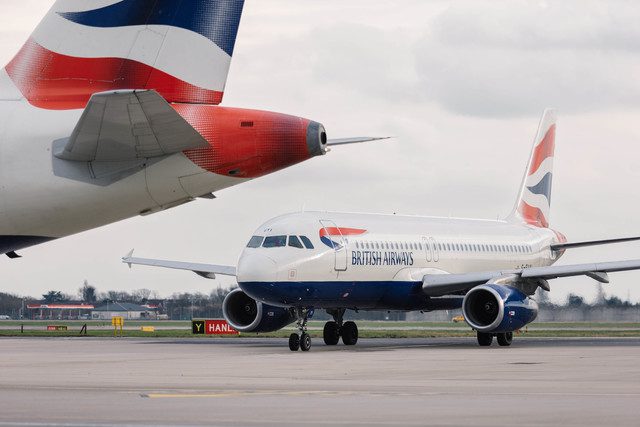
britishairways 216861929068387
British Airways is doing everything it can to prevent a repetition of the travel chaos it experienced in Q1 at London Heathrow and from IT issues. It is beefing up its organizational structure, hiring new staff, and rebuilding IT, but the carrier is frustrated by Heathrow’s lack of response to the quick recovery of air travel. British Airways doing all to prevent another Heathrow disaster.
Abnormally high absence rates of around seven percent due to Omicron disrupted BA’s schedule on numerous occasions in February and March. In the same months, it experienced three IT blackouts that led to hundreds of flight cancelations. It cost the airline €50 million in extra costs. BA is working hard on all fronts now to solve these issues, CEO Sean Doyle said on May 6 during the Q1 earnings call of parent International Airlines Group (IAG).
British Airways already has recruited 1.600 new staff, with another 3.100 in referencing as it seeks to fill some 4.000 vacancies. The airline started recruiting last October and brought back all staff to work in November after Covid-restrictions were lifted in the UK. IAG CEO Luis Gallego says that BA is quite successful in recruiting cabin crew but is temporarily sourcing crew from Iberia and Vueling to run the London operations. Shortages in the labor market make it more difficult to source ground staff, but Doyle thinks that BA is offering competitive pay packages. Thanks to low attrition now and the filled-in vacancies, there should be sufficient redundancy in its ground operations this summer.
Probably better late than never, BA is now finally addressing the IT issues from which it has suffered in the past few years. Doyle said that the carrier is laying “very solid foundations” now and is significantly investing in a new IT system within two years that is cloud-based to offer full redundancy.
BA is doing all it can to prevent more disruptions at London Heathrow but criticizes the airport for using much too low capacity plans for this year. (British Airways)
A problem is that London Heathrow is lagging behind on capacity. Both Gallego and Doyle criticized the airport for being late to respond to the recovery of air travel. “Heathrow’s projections aren’t realistic. We see our plans, we see our numbers, but we see a lack of resources coming from the airport. They updated their expectations of the number of passengers this year recently to 52 million from 45 in November. But from what we are seeing, seventy million passengers looks to be more realistic. Heathrow is the only airport that hasn’t opened all its terminals yet, with Terminal 4 to open only in June. This has caused huge pressure on our capacity”, said Doyle. Gallego said that BA had 25 percent less check-in desk capacity available compared to pre-Covid and needs to share ground capacity with American and Qatar Airways in T5. BA is talking to the UK Civil Aviation Authority (CAA) and wants it to quickly acknowledge the problem and order Heathrow to get its act in order.
Full-year capacity reduced from previous guidance
The lack of capacity at Heathrow plus uncertainties over adequate staffing come into play when looking at capacity projections for the coming months. British Airways has reduced its projected full-year capacity from eighty to 74 percent. This also takes into account lower than expected capacity on long-haul as Asia is still behind the rest of the world, plus lower capacity at its short-haul base at London Gatwick which was reopened in April. It operates ten aircraft right now, but the fleet will grow to eighteen in June as it wet leases capacity from Iberia. Finnair is also wet-leasing short-haul capacity to BA. Short-haul operations at Gatwick will be moved under the BA Euroflyer brand later this year as soon as it gets its own Airline Operating Certificate (AOC).
In its capacity guidance, Vueling will be at 102 percent this Q2 and 100 percent for the full year, Iberia at 88 and 86 percent respectively, Aer Lingus at 87 and 88 percent, and LEVEL at 63 and 52 percent. The North Atlantic will operate at 95 percent capacity in Q3.
IAG has reduced full-year capacity plans from an average of 85 to 80 percent. (IAG)
Forward bookings are very strong, especially in premium leisure, which includes First, Business, and Premium Economy in IAG’s rulebook. Premium leisure already is at 100 percent at Iberia and at eighty percent with BA compared to 2019, with Premium Business at sixty and forty percent with the two airlines. While there was a slight hick-up in bookings right after Russia started the war in Ukraine in February with ups and downs in March, Gallego said that “there is no sign that the war in Ukraine has an impact on bookings on both sides of the Atlantic. But it might be early days.” Especially strong are domestic bookings in Spain, from which both Iberia and Vueling benefit.
Group loss after tax of 787 million
IAG reported a loss after tax of €787 million compared to €1.074 billion in Q1 2021. The operating loss was €731 million compared to €1.077 billion. Expenditures were up to €4.166 billion from €2.045 billion, of which €918 million was for fuel, oil costs, and emission charges (2021: €226 million). Employee costs were also up, by 65.6 percent to €1.045 billion.
Group revenues increased to €3.435 billion from €968 million last year, of which €2.655 billion was from passengers (€459 million) and €432 million from cargo (€350 million). The higher revenues the higher capacity, which stood at an average of 65 percent compared to 58 percent in Q4 2021, but was up to 69 percent in March. Cargo revenues were driven by higher yields, but the number of cargo-only flights reduced drastically from 1.300 last year to 287 this Q1.
Revenue Passenger Kilometers (RPK) were up to 35.4 million from 6.8 million in the first quarter of last year. Seat factor increased to 72.2 percent from 45.8 percent.
By airline, Iberia again performed best with a ‘pre-exceptional operating result’ of €-89 million and €913 million in revenues, and Vueling with an operating loss of €-99 million and €261 million in revenues. BA suffered an operating loss of €-430 million on €1.706 billion in revenues. Aer Lingus posted a €-110 million operating loss with €189 million in revenues. It suffered the most of all IAG airlines, said Gallego, as Ireland upheld travel restrictions the longest of all its markets.
New CFO with strong liquidity position
IAG’s new Chief Financial Officer, Nicholas Cadbury, is pleased with the level of liquidity, which stood at €12.4 billion compared to €12.0 billion in December. Of this, €8.2 billion in cash. Aer Lingus signed a €200 million credit facility with the Ireland Strategic Investment Fund. Demonstrating the confidence of investors in IAG, it secured Enhanced Equipment Trust Certificates (EETC) funding to finance one Airbus A350-1000 for British Airways in Q1 and €461 million for two A350-900s and three A320neo’s for Iberia in Q2. Net debt was down by €0.1 billion to €11.6 billion. Cadbury said that the EETCs had been oversubscribed.
Although IAG wants to deleverage its balance sheet, this may not happen in the next couple of years. Cadbury stressed to the importance of finding the right balance between deleveraging and capital expenditures in new and more efficient aircraft, which will bring benefits to the group’s operating costs. Capex will remain at around €3.5 billion in the next years, slightly down from the current €3.9 billion.
Callego said that IAG is now taking new deliveries again, having deferred most of them at the start of the pandemic. In Q1, it received three A320neo’s, three A350-900s, and three -1000s. “We had some delays with the A350s, but now they are coming in again.” The deferral of the first delivery of BA’s Boeing 777-9 until 2025 will have an impact on future Capex.
In line with its previous guidance, International Airlines Group expects to return to a profitable operating result in Q2 and stay there for the rest of the year. Net cash flows from operating activities will also be significantly positive.
Views: 2






Quote “is significantly investing in a new IT system within two years that is cloud-based to offer full redundancy” Another new IT system? Sounds like they’ve been sucked into the con that is “cloud-based”, which basically means “hosted on someone elses’ servers somewhere else”. Those IT systems and servers still need infrastucture and support at a local level which is the issue in the first place. I’d be happier if they said they were investing and moving essential IT functions “in-house”. I’m also interested in the comments about Heathrow Airport being at fault for many of the failings. Are BA accountable in anyway for anything these days? A lot of staff are now experiencing real life outside and realising the grass is greener.